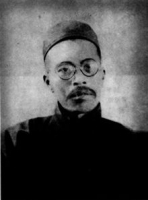| Last Name: | 王 |
| Name and Alias: | 伯隅 |
| Web/Pen/Nick Name: | 观堂 |
| Township: | 浙江 海宁 盐官镇 |
| Death Place: | 颐和园 |
|
Read works of Wang Guowei at 小说之家 Read works of Wang Guowei at 诗海 | |
BiographyA native of Haining, Zhejiang, he went to Shanghai to work as a proofreader for a newspaper, after failing to pass the Imperial Examination in his hometown, at the age of 22. There he studied in the Dongwen Xueshe (東文學社), a Japanese language teaching school, and became a protégé of Luo Zhenyu. Sponsored by Luo, he left for Japan in 1901, studying natural sciences in Tokyo. Back in China one year later, he began to teach in different colleges, and devoted himself to the study of German idealism. He fled to Japan with Luo when the Xinhai Revolution took place in 1911. He returned to China in 1916, but remained loyal to the overthrown Manchu emperor. In 1924, he was appointed professor by the Tsinghua University. In 1927, he drowned himself in Kunming Lake in the Summer Palace before the revolutionary army entered Beijing. A famous epitaphy for Wang was written by Chen YinQue.
LegacyWang focused on the studies of Chinese vernacular literature during the early year of his career. When he became convinced that Schopenhauer's metaphysics were not believable, he turned for solace to critical and philological studies of the novel Dream of the Red Chamber, as well as writing a concise history of the theaters of the Song and Yuan dynasties. Later he changed his academic direction, focusing on philology and ancient history. His works on ancient history and philology are collected in Guantang Jilin (觀堂集林).
References1.^ Bonney, Joey (1986). Wang Kuo-wei: an intellectual biography. Harvard University Press. ISBN 0-674-94594-8.
2.^ Cheng, Zhongying; Nicholas Bunnin (2002). Contemporary Chinese Philosophy. Blackwell Publishers. p. 37. ISBN 0-631-21725-8.
3.^ "Humanities reborn at Tsinghua". China Daily. 2003-12-30. http://www.chinadaily.com.cn/en/doc/2003-12/30/content_294411.htm. Retrieved 16 April 2009.
4.^ Benjamin Schwartz, "Themes in intellectual history: May Fourth and After," Cambridge History of China Volume 12 Republican China 1912-1949 Pt 1 (Cambridge: Cambridge University Press, 1983), p. 418
